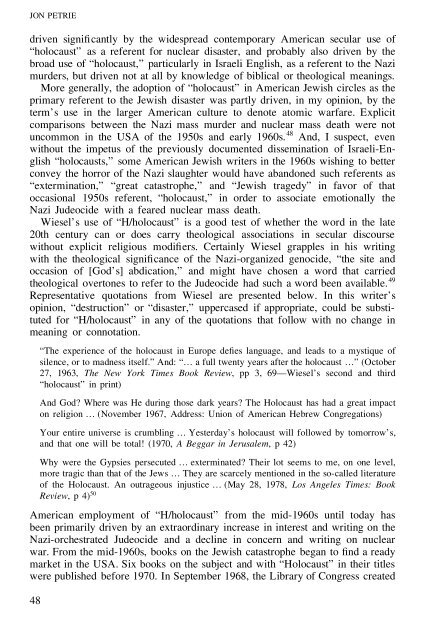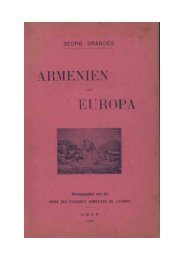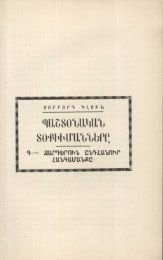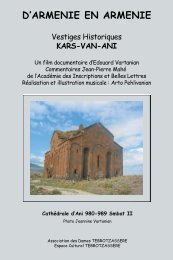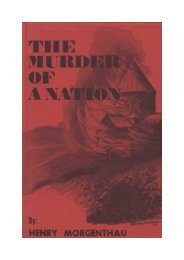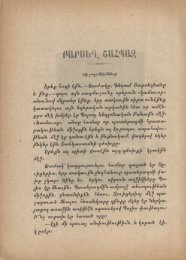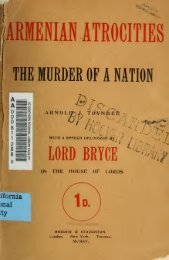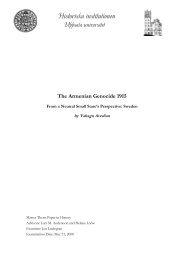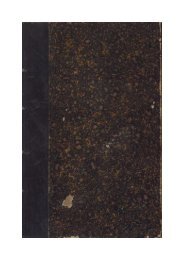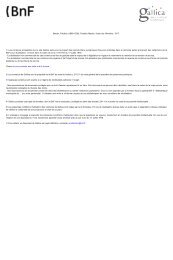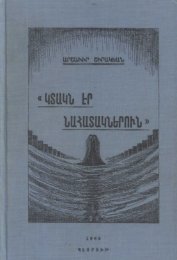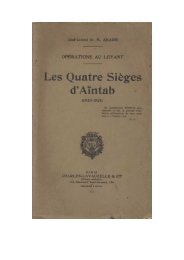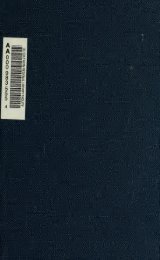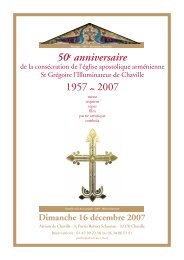The secular word HOLOCAUST: scholarly myths, history, and 20th ...
The secular word HOLOCAUST: scholarly myths, history, and 20th ...
The secular word HOLOCAUST: scholarly myths, history, and 20th ...
Create successful ePaper yourself
Turn your PDF publications into a flip-book with our unique Google optimized e-Paper software.
JON PETRIEdriven signi cantly by the widespread contemporary American <strong>secular</strong> use of“holocaust” as a referent for nuclear disaster, <strong>and</strong> probably also driven by thebroad use of “holocaust,” particularly in Israeli English, as a referent to the Nazimurders, but driven not at all by knowledge of biblical or theological meanings.More generally, the adoption of “holocaust” in American Jewish circles as theprimary referent to the Jewish disaster was partly driven, in my opinion, by theterm’s use in the larger American culture to denote atomic warfare. Explicitcomparisons between the Nazi mass murder <strong>and</strong> nuclear mass death were notuncommon in the USA of the 1950s <strong>and</strong> early 1960s. 48 And, I suspect, evenwithout the impetus of the previously documented dissemination of Israeli-English“holocausts,” some American Jewish writers in the 1960s wishing to betterconvey the horror of the Nazi slaughter would have ab<strong>and</strong>oned such referents as“extermination,” “great catastrophe,” <strong>and</strong> “Jewish tragedy” in favor of thatoccasional 1950s referent, “holocaust,” in order to associate emotionally theNazi Judeocide with a feared nuclear mass death.Wiesel’s use of “H/holocaust” is a good test of whether the <strong>word</strong> in the late<strong>20th</strong> century can or does carry theological associations in <strong>secular</strong> discoursewithout explicit religious modi ers. Certainly Wiesel grapples in his writingwith the theological signi cance of the Nazi-organized genocide, “the site <strong>and</strong>occasion of [God’s] abdication,” <strong>and</strong> might have chosen a <strong>word</strong> that carriedtheological overtones to refer to the Judeocide had such a <strong>word</strong> been available. 49Representative quotations from Wiesel are presented below. In this writer’sopinion, “destruction” or “disaster,” uppercased if appropriate, could be substitutedfor “H/holocaust” in any of the quotations that follow with no change inmeaning or connotation.“<strong>The</strong> experience of the holocaust in Europe de es language, <strong>and</strong> leads to a mystique ofsilence, or to madness itself.” And: “… a full twenty years after the holocaust …” (October27, 1963, <strong>The</strong> New York Times Book Review, pp 3, 69—Wiesel’s second <strong>and</strong> third“holocaust” in print)And God? Where was He during those dark years? <strong>The</strong> Holocaust has had a great impacton religion … (November 1967, Address: Union of American Hebrew Congregations)Your entire universe is crumbling … Yesterday’s holocaust will followed by tomorrow’s,<strong>and</strong> that one will be total! (1970, A Beggar in Jerusalem, p 42)Why were the Gypsies persecuted … exterminated? <strong>The</strong>ir lot seems to me, on one level,more tragic than that of the Jews … <strong>The</strong>y are scarcely mentioned in the so-called literatureof the Holocaust. An outrageous injustice … (May 28, 1978, Los Angeles Times: BookReview, p 4) 50American employment of “H/holocaust” from the mid-1960s until today hasbeen primarily driven by an extraordinary increase in interest <strong>and</strong> writing on theNazi-orchestrated Judeocide <strong>and</strong> a decline in concern <strong>and</strong> writing on nuclearwar. From the mid-1960s, books on the Jewish catastrophe began to nd a readymarket in the USA. Six books on the subject <strong>and</strong> with “Holocaust” in their titleswere published before 1970. In September 1968, the Library of Congress created48


